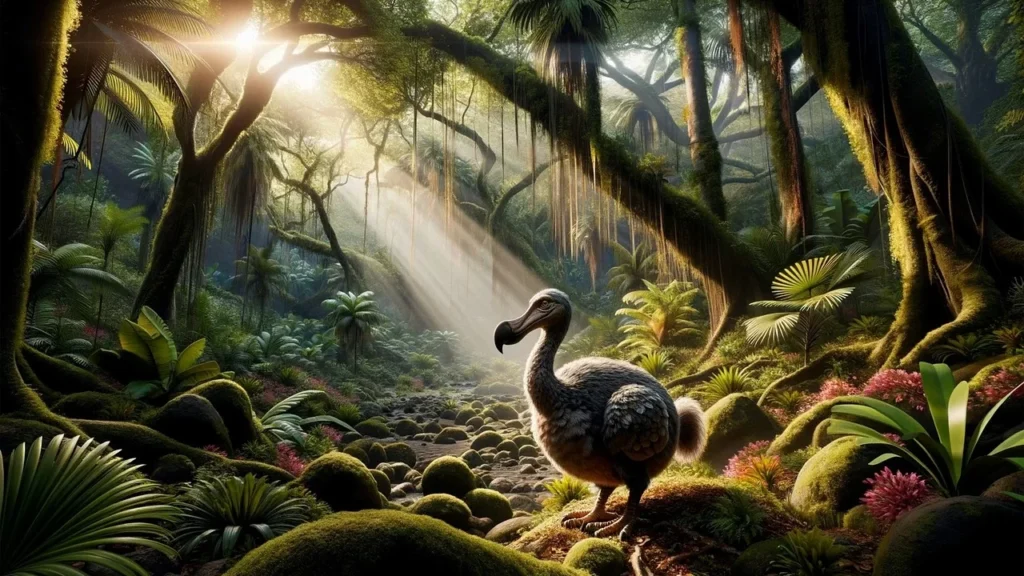Table of Contents
Ever wondered about the flightless wonders known as dodo birds? Join Your Animal Guide on a quest into their mysterious realm, exploring the intriguing features that set them apart. From their unique island habitat in Mauritius to the tragic events that led to their extinction, come along as we delve into the cultural symbols and scientific pursuits that keep the memory of these extraordinary birds alive.

Meet the Dodo
The dodo, characterized by its plump body, short wings, and distinctive beak, was a flightless bird endemic to the island of Mauritius. Adapted to an environment devoid of natural predators, the dodo’s flightlessness became a defining feature, rendering it vulnerable when humans arrived.
The dodo’s plump physique and small wings made it a unique presence on the island. Its large, hooked beak, adapted for a diet of fruits and hard seeds, showcased its specialization in the island’s ecological niche.
The dodo’s likely diet included fruits, nuts, and seeds found on the forest floor. Evolutionary adaptations, such as flightlessness, allowed the dodo to thrive in the absence of land mammals on Mauritius, establishing its place in the island’s delicate ecosystem.

Island Paradise: Mauritius and the Dodo’s World
Mauritius, a paradise in the Indian Ocean, played host to the dodo and several other endemic species. The isolation of the island, free from land mammals, shaped the dodo’s behavior and evolutionary path.
The role of Mauritius’ isolation in the dodo’s evolution cannot be understated. With no land mammals to contend with, the dodo evolved with a lack of fear towards humans and other potential threats, a trait that would prove fatal in the years to come.
The delicate balance of the island’s ecosystem was disrupted by the arrival of humans and their activities. Other endemic species on Mauritius faced a similar fate as the dodo, creating a tragic chapter in the natural history of the island.
The Tragic Tale of Extinction
Despite the idyllic setting, the dodo faced a grim fate with the arrival of sailors, settlers, and invasive species. Human activities, including hunting and habitat destruction, precipitated the decline of this unique bird.
The arrival of sailors and settlers on Mauritius marked the beginning of the end for the dodo. Introduction of invasive species, such as rats, monkeys, and pigs, which preyed on dodo eggs and outcompeted them for food.
The lack of fear towards these new threats sealed the fate of the unsuspecting dodo. As the island’s ecosystem crumbled under human influence, the dodo population dwindled.
Varying accounts of the dodo’s decline exist, with some suggesting they were already rare by the late 1600s.

Cultural Depictions and Scientific Legacy
The dodo, though extinct, lives on in cultural depictions, symbolizing extinction and the consequences of human actions. Modern scientific techniques, including DNA analysis, provide valuable insights into the genetic makeup of this enigmatic bird.
The dodo’s role as a symbol in various forms of creative expression is evident in art and literature. Often depicted as a symbol of innocence or extinction, the dodo’s image has become deeply ingrained in our cultural consciousness.
Scientific study, aided by advancements like DNA analysis, has provided crucial insights into the dodo’s genetic makeup. While complete specimens or live dodos were not preserved, the scientific community continues to uncover the mysteries of this extinct bird.
Preserving the Memory of the Dodo
Efforts to showcase the dodo’s remains and reconstructions in museums underscore the importance of preserving the memory of extinct species. Your Animal Guide is committed to sharing stories of animals, both extant and extinct, fostering a deep appreciation for the creatures that share our planet.
Museums and exhibitions around the world play a crucial role in preserving the memory of the dodo. Through reconstructions and displays, they provide a tangible link to a species lost to time.
Your Animal Guide’s commitment extends beyond the dodo to encompass all animals, both past and present. By understanding the stories of extinct species, we hope to encourage a deeper appreciation for the delicate balance of our planet’s ecosystems.

The Legacy Continues
As we explore the tale of the dodo, let it serve as a poignant reminder of the delicate dance between humanity and the natural world. Your Animal Guide is dedicated to unraveling such stories, celebrating the diversity of life, and nurturing a profound understanding of the creatures that share our planet.
As we conclude our journey through the dodo’s tale, Your Animal Guide invites you to explore more within our birds category. Discover the intricate lives of these marvelous creatures and broaden your understanding of the natural world. If you haven’t already, catch up on our previous posts, including insights into the world of Shoebills, 18 Amazing Cat Facts, 10 Dogs That Broke World Records, and 7 Bird Species for First-Time Bird Owners. Each article promises to captivate and enrich your appreciation for the incredible diversity of the animal kingdom.
F. A. Q. about Dodo Birds
Are dodo birds extinct?
Yes, dodo birds are extinct. The last reported sightings date back to the late 17th century, and there are no living specimens today.
When did dodo birds go extinct?
Dodo birds are believed to have gone extinct by the end of the 17th century, with varying accounts suggesting they were already rare by that time.
Why did dodo birds go extinct?
The extinction of dodo birds was primarily due to human activities, including the introduction of invasive species, hunting, and habitat destruction.
What are dodo birds?
Dodo birds were flightless birds endemic to Mauritius. They had a distinctive appearance, characterized by a plump body, small wings, and a large, hooked beak. The lack of natural predators on the island contributed to their vulnerability and eventual extinction.



Some genuinely nice and useful information on this internet site, as well I think the design has excellent features.